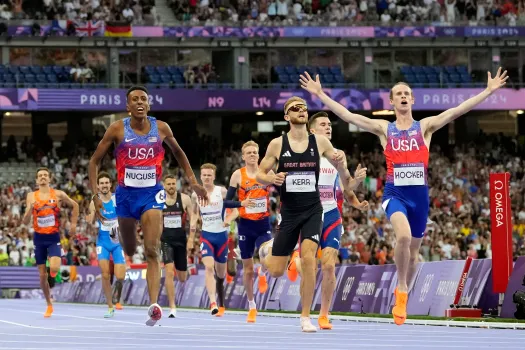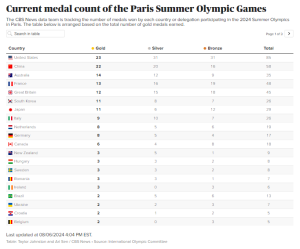Hocker, who recorded his previous personal best of 3:30.59 at Olympic trials this summer, notched the first U.S. win in the metric mile since Matt Centrowitz took gold in 2016.
This is the first time Americans put two men on the 1,500-meter podium since the Stockholm Games in 1912.
“I kind of figured it would be fast,” Hocker said. “I figured Ingebrigtsen would want to take it out of guys like me. But I knew I hadn’t been tested at this level yet, and I knew I was capable of being as strong as any of those guys out there.”
All eyes for this one were trained on Ingebrigtsen, the defending champion out of Norway who came in with a point to prove, and Kerr, the Scotsman who beat him last year at world championships.
Ever since that win, Kerr and Ingebrigtsen poked at each other. Among the salvos that stuck was Kerr’s assertion that Ingebrigtsen only won races with pacesetters, the likes of which are not allowed at major races like this.
Against that backdrop, Ingebrigtsen darted to the front quickly and ran there for the first 3 1/2 laps, while Kerr traded between second and third, getting ready for his typical windup and a potential slingshot past the Norweigan over the closing stretch, much the way he did last year.
“Of course, it’s a tactical error that I’m not able to reduce my pace the first 800,” Ingebrigtsen said.
While he and Kerr were wearing each other out, Hocker, at 5-foot-9 1/2 and more than 3 1/2 inches shorter than the top two contenders, almost looked like he was trying to photo bomb the end of this race.
As they entered the homestretch, he snuck up on the inside once, only to have Ingebrigtsen block that move.
So, Hocker fell back and wound up for another try with about 50 meters left. Both he and Kerr, who was racing on the outside, passed Ingebrigtsen, then Hocker beat the Scot to the finish line, first with a look of disbelief on his face, but then thumping his chest twice to celebrate a win no one saw coming — maybe except for him.




